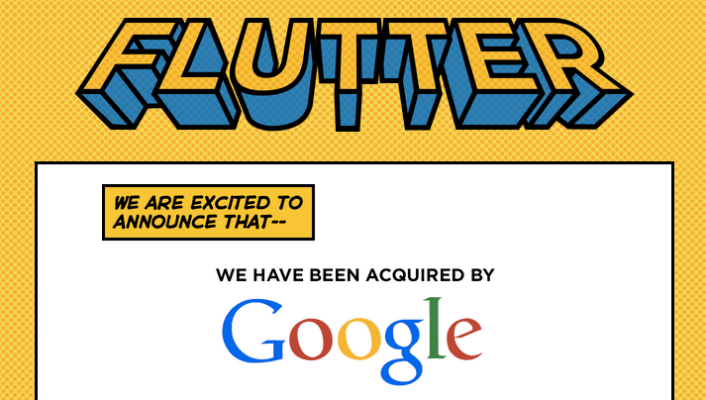Google’s Glass, Android and other products may soon be picking up more Kinect-style gesture features: the company has bought Flutter, a Y Combinator-backed startup that focuses on gesture recognition technology. Its first and only product — an app that provides gesture detection and recognition from standard webcam devices — will remain live and operational, the company says.
Terms of the deal were not disclosed but we have heard that the price was around $40 million.
Flutter confirmed the news on its site, where it said it will continue to offer its app — it currently has a Mac app — while it also works on research at Google. “We are thrilled to announce that we will be continuing our research at Google. We share Google’s passion for 10x thinking, and we’re excited to add their rocket fuel to our journey,” Navneet Dalal, one of the co-founders, writes. (Nice gaming reference, Navneet!) The full note follows below.
That Mac app (which, btw, added Chrome support in February) clearly struck a chord, with downloads in more than 90 countries, reaching the top-five apps in the Mac App Store in its first two weeks of launch in some 30 of those, and number 1 in 14. It had around 1 million users on desktop.
Flutter had been planning to launch a new product in August, we understand, but that plan abruptly got delayed. Today’s news gives us a clue why. What was that product? Likely a Windows version, which was already in private alpha; or an enhanced Mac version with more features — which was also in the works, as Dalal and his co-founder Mehul Nariyawala noted to Colleen last year.
Flutter was in the YC winter class of 2012, and had raised $1.4 million in seed funding from Andreessen Horowitz,NEA, and Spring Ventures, along with Start Fund and a handful of individual angel investors.
Gesture technology is a big area these days, with services such as those from Microsoft and the Kinect, along with other products like the Leap Motion sensor bringing the concept into the mainstream. Others that are also investing further in gesture technology include Intel’s acquisition of Omek. Apple, meanwhile, has yet to make a move here but there have been rumors that it will, too.
It’s unclear if Google will keep Flutter working on standalone apps, or whether the technology will get integrated further into its own software and hardware. For now, a Google spokesperson had this to say:
“We’re really impressed by the Flutter team’s ability to design new technology based on cutting-edge research. We look forward to supporting and collaborating on their research efforts at Google.”
Here’s the full note from Flutter announcing the sale and a video of Flutter from its launch:
When we started three years ago, our dream to build a ubiquitous and power-efficient gesture recognition technology was considered by many as just “a dream”, not a real possibility. Since then, we have strived to build the best machine vision algorithms and a delightful user experience.
Even after we launched our first app, we didn’t stop our research; your enthusiasm and support pushed us to continue to do better. We’re inspired everyday when we hear, for example, that Flutter makes you feel like a superhero — because any sufficiently advanced technology should be indistinguishable from magic, right?
Today, we are thrilled to announce that we will be continuing our research at Google. We share Google’s passion for 10x thinking, and we’re excited to add their rocket fuel to our journey.
We’d like to extend a special thank you to all of our users; your feedback and evangelism inspire us every day. Flutter users will be able to continue to use the app, and stay tuned for future updates.
